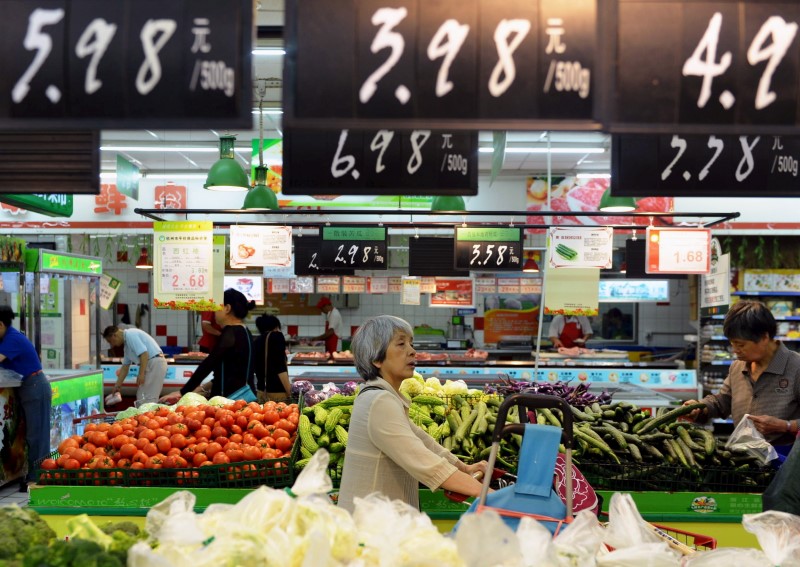BEIJING (Reuters) - China's producer price inflation eased for the third straight month in May on tumbling prices of raw materials, signaling a broader cooling in economic activity as profits are squeezed by slackening domestic demand and rising financing costs.
Moderating factory gate inflation in the world's second-biggest economy could be a further worry for global central banks like the U.S. Federal Reserve and European Central Bank, which are puzzling over why domestic prices have remained sluggish despite improving economic growth.
China's producer price index (PPI) rose 5.5 percent in May from a year earlier, the National Bureau of Statistics said on Friday, versus an expected gain of 5.7 percent and slower than the 6.4 percent increase in April.
"Declines in non-food inflation and producer price inflation still point to an easing of broader price pressures," said Julian Evans-Pritchard, China economist at Capital Economics, in a note to clients.
"More importantly, however, we expect price pressures elsewhere to continue to ease as economic activity slows, disappointing hopes for a sustained period of reflation that would help erode corporate debt burdens."
A renaissance in China's steel industry has been a major driver of the world's second-largest economy in recent quarters, helping to generate the strongest profit growth in years and adding to a reflationary pulse across the global manufacturing sector.
Now, however, the opposite may be true as cooling factory gate prices in China appear to be filtering through to benign inflation readings in the United States and Europe.
"Given the strong relation between raw materials PPI and import prices (available later this month), the dip in raw materials PPI indicates the reflation trade is at least stalling, if not outright dying for Asia (and the world)," Vaninder Singh, Asia economist at NatWest Markets, wrote in a note.
SLOW DEMAND, PROFIT SQUEEZE
Analysts are also worried that market demand won't be strong enough to absorb the surging supplies of steel from the world's top producer.
"There was an improvement in demand," said CRU analyst Richard Lu. "But we don't think it will be sustainable because we're approaching summer when construction usually slows down."
China's biggest steelmaker, Baoshan Iron & Steel (SS:600019) cut its main steel products prices for May and June after a long series of increases.
Factory gate prices had only turned positive on a year-on-year basis last September, after falling for nearly five years, leaving many industrial firms saddled with idle capacity and less cash flow to service their debts.
Analysts expect China's economy to cool in coming months after a strong first quarter, with recent factory activity data also indicating a gradual slowdown is underway.
A flurry of official measures targeting financial deleveraging is expected to further squeeze financing costs, eroding profits and broad economic activity over the remainder of the year.
The consumer price index (CPI) in May rose 1.5 percent from a year earlier, accelerating from April's 1.2 percent increase, and in line with market expectations.
Food prices, the biggest component of the consumer price index (CPI), fell at a slower 1.6 percent pace from the previous year, after sliding 3.5 percent in April.
China has set its inflation target at 3 percent in 2017, the same as the year before, suggesting policy makers still have room to tighten financial conditions after years of debt-fueled stimulus.
